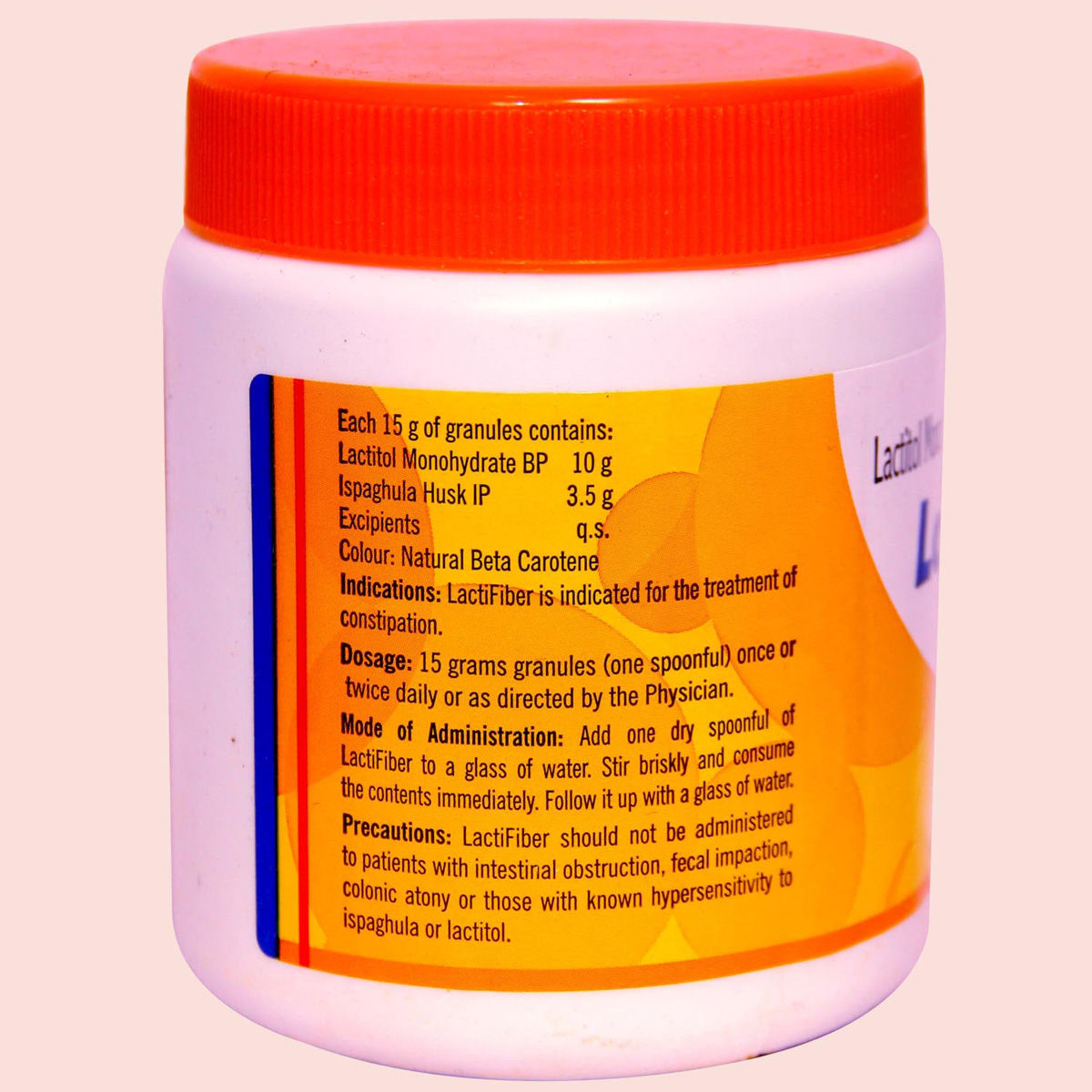Lactitol Monohydrate
About Lactitol Monohydrate
Lactitol Monohydrate belongs to the group of medicines called laxatives used to treat constipation. Additionally, Lactitol Monohydrate is also used to prevent hepatic encephalopathy (decreased brain function due to liver disease). Constipation refers to infrequent bowel movements in which the stools are often dry, painful, and hard to pass. Hepatic encephalopathy is a liver disease in which the liver does not remove toxins from the body, which leads to loss of brain function.
Lactitol Monohydrate contains Lactitol, a disaccharide sugar that breaks down into low-molecular-weight organic acids in the colon, increasing the osmotic pressure. This causes an increase in water content in stools, and stool volume, thereby makes the stool softer and more comfortable to pass and provides relief from constipation. In patients with hepatic encephalopathy, Lactitol lowers the colon pH, thereby suppressing the absorption of unionized ammonia and other toxins. It also enhances nitrogen excretion through faeces.
Take Lactitol Monohydrate as prescribed by your doctor. Try to take the Lactitol Monohydrate at a fixed time for the best results. You are advised to take Lactitol Monohydrate for as long as your doctor has prescribed it for you, depending on your medical conditions. You may experience certain common side effects in some cases, such as abdominal distension, cramps, and flatulence (gas). Most of these side effects do not require medical attention and will resolve gradually over time. However, you are advised to talk to your doctor if you experience these side effects persistently.
To treat your condition effectually, continue taking Lactitol Monohydrate for as long as your doctor has prescribed. Drink plenty of fluids (at least 6-8 glasses) while taking Lactitol Monohydrate. Consult your doctor before taking Lactitol Monohydrate if you are pregnant or breastfeeding, and your doctor will prescribe you Lactitol Monohydrate only if the benefits outweigh the risks. Inform your doctor if there is no bowel movement or if you find rectal bleeding after taking Lactitol Monohydrate. Do not take Lactitol Monohydrate for more than a week as it might cause dependency on Lactitol Monohydrate for a bowel movement.
Uses of Lactitol Monohydrate
Medicinal Benefits
Lactitol Monohydrate belongs to the group of medicines called laxatives used to treat constipation. Additionally, Lactitol Monohydrate is also used to prevent hepatic encephalopathy (decreased brain function due to liver disease). Lactitol Monohydrate contains Lactitol (laxative). Lactitol is a disaccharide sugar. It works by breaking down into low-molecular-weight organic acids in the colon, which increases the osmotic pressure. This causes an increase in water content in stools, and stool volume, thereby makes the stool softer and more comfortable to pass and provides relief from constipation. In patients with hepatic encephalopathy, lactitol lowers the colon pH, thereby suppresses the absorption of unionized ammonia and other toxins. It also enhances nitrogen excretion through faeces.
Directions for Use
Storage
Side Effects of Lactitol Monohydrate
- Flatulence (wind)
- Abdominal pain
- Abdominal cramps
- Indigestion
- Dehydration
Patients Concern
Disease/Condition Glossary
Constipation: It refers to infrequent bowel movements. The stools are often dry, painful, and hard to pass. Constipation is a condition in which the person has fewer than three bowel movements in a week. However, bowel patterns may vary from person to person. Symptoms include bloating, abdominal pain, and feeling as if the bowel movement is incomplete. Constipation occurs when the normal muscle contractions in the large intestine slow down, which causes the incomplete elimination of the bowel from the body. Constipation could be associated with a sudden change of diet, a diet with less fiber, not drinking enough liquids, lack of exercise, loss of tone of the bowel muscles in older people, or staying in bed for a longer duration.
Liver encephalopathy: It is a liver disease in which the liver does not remove the toxins from the body, which leads to loss of brain function.
FAQs
Lactitol Monohydrate works by breaking down into low-molecular-weight organic acids in the colon, which increases the osmotic pressure. This causes an increase in water content in stools, and stool volume, thereby makes the stool softer and easier to pass and provides relief from constipation.
Do not take Lactitol Monohydrate with antacid and anti-bacterial medicines as it may cause decreased efficacy.
In patients with hepatic encephalopathy, lactitol lowers the colon pH, thereby suppresses the absorption of unionized ammonia and other toxins. It also enhances nitrogen excretion through faeces.
Diarrhoea might occur if Lactitol Monohydrate is taken in larger doses. Drink lots of fluids and eat food rich in fibre if you experience diarrhoea. If you find blood in stools (tarry stools) or if you experience excess diarrhoea consult your doctor. Do not take anti-diarrheal medicine on your own.
Do not take Lactitol Monohydrate for more than a week as it might lead to dependency on Lactitol Monohydrate for a bowel movement. Taking Lactitol Monohydrate for longer durations might also cause dehydration, imbalance of fluids and salts in the body, affecting the tightness of muscles in the intestine. If your bowel movement is irregular even after taking Lactitol Monohydrate for a week, consult your doctor.










